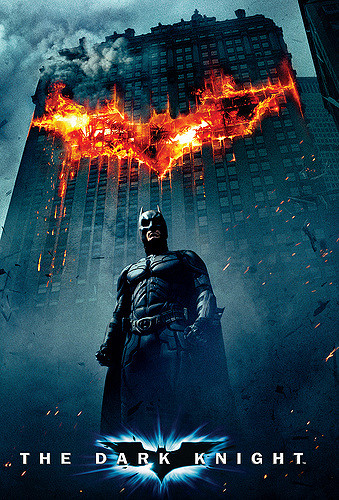Warning: Spoilers follow for The Dark Knight. If you haven’t seen the movie (go see it) read at your own risk.
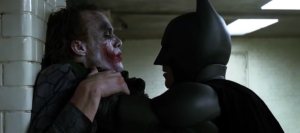 On July 18, 2008, audiences were treated to one of the best superhero films of all time with the release of Christopher Nolan’s “The Dark Knight.” The film was critically acclaimed and set box offices records.
On July 18, 2008, audiences were treated to one of the best superhero films of all time with the release of Christopher Nolan’s “The Dark Knight.” The film was critically acclaimed and set box offices records.
The sequel to 2005’s “Batman Begins” continues the story of Batman/Bruce Wayne (Christian Bale) trying to clean up the city, and dealing with several doppelganger Batman wannabes and Lau, a triad gang leader and corrupt accountant working in Wayne Enterprises, in the film’s first act.
Meanwhile, The Joker (Heath Ledger), a new criminal in Gotham, is causing chaos by robbing banks and taking over gangs in his attempt to create anarchy and undermine Batman’s influence on the city.
Other drama going on in the city is the emergence of Harvey Dent, (Aaron Eckhart) a new District Attorney fighting criminals as well as corrupt cops of the Gotham P.D. Rachel Dawes (Maggie Gyllenhaal) is the assistant D.A. and one of the few people who knows Wayne’s true identity, and is dating Dent.
Lieutenant James Gordon (Gary Oldman) is trying to get his force in line and work with Dent to arrest the mob families, but both men question the others’ integrity.
Lucius Fox (Morgan Freeman) and Alfred Pennyworth (Michael Caine) also aid Wayne throughout the whole ordeal, offering technologies and wisdom to help combat The Joker.
All of these stories intersect and work with each other in the film to create a great two and a half hour narrative.
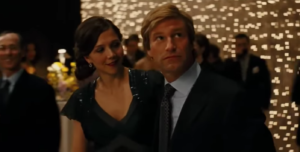 This film was only more evidence that the nature of superhero movies was changing. During this time, most superhero films were somewhat silly and didn’t take themselves too seriously.
This film was only more evidence that the nature of superhero movies was changing. During this time, most superhero films were somewhat silly and didn’t take themselves too seriously.
Examples of that were “Daredevil,” “Superman Returns,” the “Fantastic 4” films, the “Blade” trilogy and even older Batman films like “Batman Forever” and “Batman & Robin.” The only real outliers were the Sam Raimi “Spider-Man” films and the “X-Men” saga.
However “The Dark Knight” and the previous movie created their own dark, gritty, “real” tone different from any other comic book movie before it, and had Christopher Nolan at the helm, who was a respected filmmaker known for films like “Memento,” “Insomnia” and “The Prestige.”
This movie was seen as not only a great superhero movie, but as a great film in general. The acting, especially that of Ledger, was something rare to see in the genre. The plot and pacing of the film were seen as more of a crime drama than a full-on superhero movie. Believe it or not, some people used that as a criticism of the film at the time.
The memorable lines and fantastic action sequences still kept the feeling of a superhero film, but everything else kept it grounded in reality. It showed Hollywood that a superhero movie didn’t have to be a formulaic, campy affair with clear good guys and bad guys; we had come a long way from the Christopher Reeves “Superman” films of the late 70s and early 80s.

Also important to note is that this year also saw the beginning of the Marvel Cinematic Universe, with the release of “Iron Man.”
That movie that took a similar approach to “The Dark Knight,” by including more realistic action scenes, deeper, flawed characters and directors and actors with real chops involved in it.
All of this is to say that these two movies allowed future films in the genre to take risks, for example, we got R rated superhero films with “Logan” and “Deadpool.” More bizarre and obscure characters were given a film and were treated seriously enough to be big name players, like the Guardians of the Galaxy and Ant-Man.
Perhaps the biggest example was adding continuity and multiple arching storylines throughout different superheroes’ franchises. Back then the concept of the MCU was insane to commit to, and now because of its success every franchise wants their own cinematic universe.
As much as “The Dark Knight” was a critical success and benchmark for superhero films, it also broke plenty of box office records and earned several industry accolades.
It scored a 94 percent on Rotten Tomatoes and an 82 out of 100 on Metacritic, which was among the best-reviewed films of the genre at the time. It was also nominated for eight Academy Awards, and won two. One for Best Sound Editing, and the other for Best Supporting Actor for Heath Ledger.
It was only the second posthumous award given out and the first acting win for a superhero film.
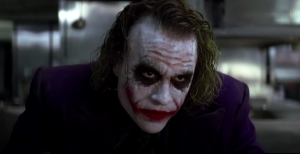 Controversy arose from the lack of a Best Picture nomination for the film. Critics and fans alike criticized the Academy for the snub, and it is believed that this pushed the Oscars to make the Best Picture field larger, changing from five eligible films to 10.
Controversy arose from the lack of a Best Picture nomination for the film. Critics and fans alike criticized the Academy for the snub, and it is believed that this pushed the Oscars to make the Best Picture field larger, changing from five eligible films to 10.
The film also smashed box office records, including having the highest grossing domestic opening with $158 million. This record would stand for three years. It became the fourth film in history to gross $1 billion. It is the highest grossing film of 2008, and the 35th highest grossing movie of all time.
“The Dark Knight” cannot be looked at as anything but a success. It broke box office records, earned critical acclaim and industry rewards and set the standard for many of the superhero films we love today.
Without “The Dark Knight,” we may not have gotten “The Avengers” or “Logan,” two of the best movies in the superhero genre that took huge risks of their own.
Looking back, it made a personal impact on me, as it was one of the first real intense films I saw in theaters. It gave me an appreciation for what goes into filmmaking and may have been one of the first times I really thought about a movie long after I’d seen it.
It brought up hard questions about the human condition and vigilantism. What constitutes the difference between a hero and a villain? Where does Batman lie in that balance? Sure he does heroic acts and saves people, but how many people have died because the newest maniac comes into Gotham wanting to draw out and kill the Caped Crusader?
 Have his efforts really made a difference on the city? The police force is still corrupt, and two of the purest citizens of the city (Rachel and Harvey) die due to Bats’ inability to stop The Joker in time, who in turn exists solely because of Bruce’s actions.
Have his efforts really made a difference on the city? The police force is still corrupt, and two of the purest citizens of the city (Rachel and Harvey) die due to Bats’ inability to stop The Joker in time, who in turn exists solely because of Bruce’s actions.
It also asked the question of how much it would take for normal human beings to turn on each other for their (or someone else’s) safety. Every one of Joker’s plots involved this; how many people would die before the citizens riot and bring the Batman to him? Would they kill the one man who claims to know Batman’s identity to save a hospital?
And maybe my favorite scene in the film, the two ferries that could bomb each other to stay alive; one full of regular citizens, and one full of inmates.
The best part is that in the end, the people on the ferries, from two completely different walks of life, would rather die than willingly kill others. They are not like The Joker, for better or worse.
It’s heavy stuff, especially in a film focused on a guy afraid of bats fighting crime in a rubber suit. 12 year old (and 22 year old) me ate it up.
I was unfamiliar with Batman, but loved this movie. It inspired me to read more comics and opened the door for me to watch more mature films. It’s a movie I recommend to anyone, comic book fan or not, as it encapsulates everything good about the genre.
The performances are great (special mention goes to Gary Oldman, Michael Caine and Heath Ledger) the score is fantastic, the cinematography is beautiful and the action scenes are spaced out well and are a blast to watch. It has a great balance of character moments, plot development, commentary on the human psyche and some good old fashion action.
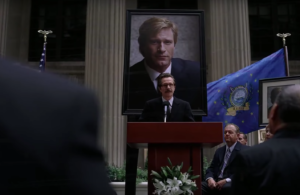 However, following its release, too many films tried to capture what made “The Dark Knight” great, without actually putting the same effort and care into the process.
However, following its release, too many films tried to capture what made “The Dark Knight” great, without actually putting the same effort and care into the process.
The most guilty offender of this is probably “Man of Steel,” a decent Superman reboot that ushered in the DC Extended Universe. For some reason, it was unnecessarily gritty, not fitting the squeaky clean character. It also didn’t help that he killed the villain in the end.
The next film in the DCEU, “Batman v Superman: Dawn of Justice” fell in the same trap, being needlessly dark and turning characters like Jesse Eisenberg’s Lex Luthor and Doomsday into caricatures of the source material.
The only film to really follow in the footsteps of “The Dark Knight’s” gritty realism was 2017’s “Logan.” It was a fitting send off to one of the already naturally dark characters in comics that set out to be not only a great superhero movie, but a great movie in general.
Despite the cheap imitations and slightly underwhelming third film that followed, “The Dark Knight’s” legacy in film cannot be overstated. 10 years later, it remains a bonafide classic that is the best of the Nolan “Batman” trilogy. It is one of my favorite movies ever and is the first thing that comes to my mind when I think of the Caped Crusader.
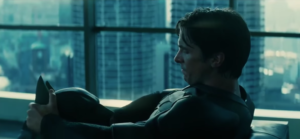 Henry Wolski
Henry Wolski
Executive Editor

